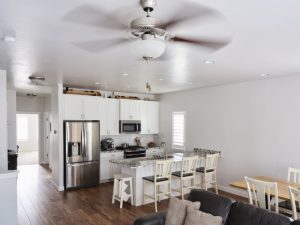Ceiling fans can make a huge difference in a home. Particularly in a climate like ours, they can make you much more comfortable in the heat of the summer. And if you know how to use them properly, they can reduce your use of both AC and heat, cutting your utility bills and extending the lifespans of your air conditioner and your heating system.
However, it can be easy to overlook a ceiling fan. Perhaps you haven’t used yours in a while. Or perhaps when you’ve tried to use it, you’ve realized that something is wrong with it. What can go wrong with ceiling fans? Who can repair them? How can you get all the benefits that your ceiling fan should offer? We’ll tell you.
Signs of a Ceiling Fan Problem
If you’ve got ceiling fans in your home, they should turn smoothly and steadily. All their settings should be functional, and they should easily switch the direction that they’re turning. All switches meant to turn on the fan should work properly. And if they have an attached light fixture, as many ceiling fans do, it should be easy to use and fully functional as well.
When something isn’t quite right, you need to get ceiling fan repair. This would include if the fan wobbles or clunks, makes other noises, doesn’t switch between settings easily, only spins in one direction, or fails to spin entirely. You also need repairs if only the fan but not the light works, if not all the switches work, or if the fan turns itself off when you have left it running.
Finally, you should consider repair if you notice anything visibly wrong with the ceiling fan. Rusted or loose hardware, damaged or worn blades, or a broken light fixture might be repairable. But even if ceiling fan replacement is required, it’s worth addressing the problem before the ceiling fan falls.
How Ceiling Fan Problems Occur
In many cases, the reason a ceiling fan is struggling simply has to do with time. Nothing lasts forever, and that’s especially true of things with moving parts. Wear and tear is inevitable. It’s also possible for actual damage to occur. For example, electrical wires can short from exposure to water or be nibbled by mice.
The other scenario that leads to ceiling fan problems is if the fan was not installed properly. To minimize movement and vibration, it’s important to have the fan in the ideal location and effectively secured in position. DIY ceiling fan installations make problems down the line much more likely, so it’s best to have all ceiling fans professionally installed.
Who Repairs Ceiling Fans
Your ceiling fan is, at its core, an electrical appliance which directly connects to your home’s electrical wiring system. The person who has the knowledge and tools to repair it is your electrician. Whether the problem is with the fan itself, the attached light fixture, or the wiring connecting them, your electrician will be properly equipped to any repairs.
Get prompt house fan repair in Columbia, SC as soon as you realize something is wrong.
Contact Fulmer Heating & Cooling today for an electrical expert in Columbia, SC!

